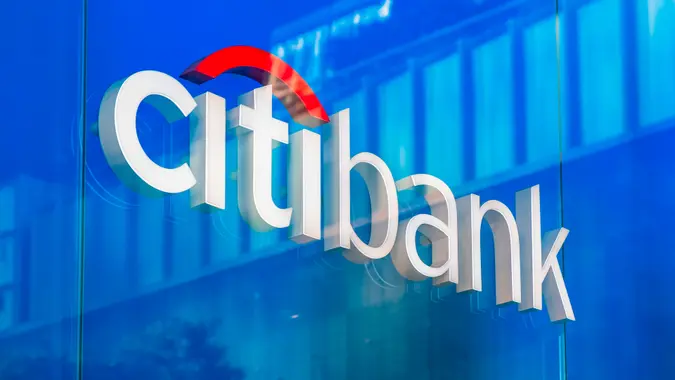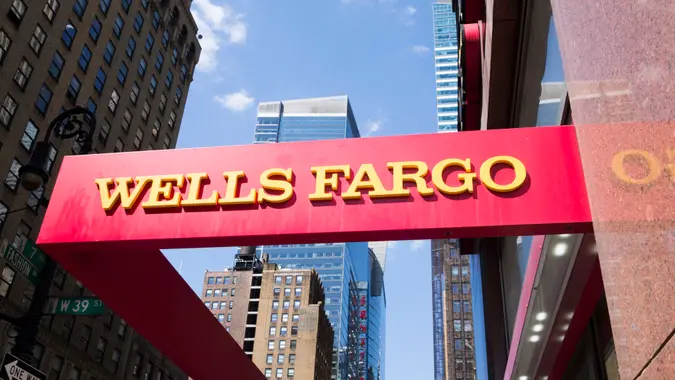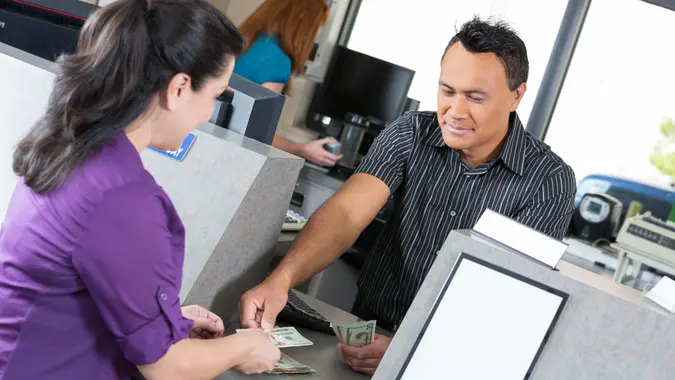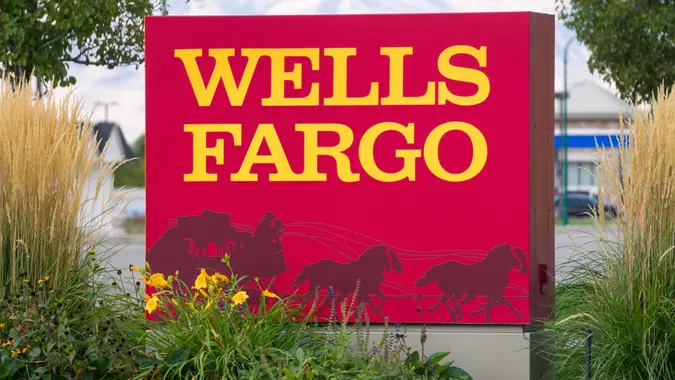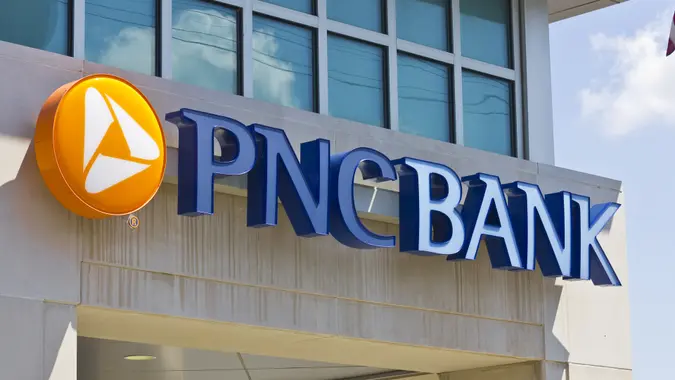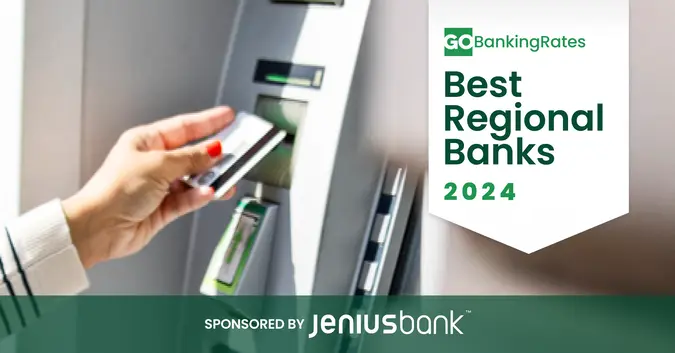How To Open a U.S. Bank Account
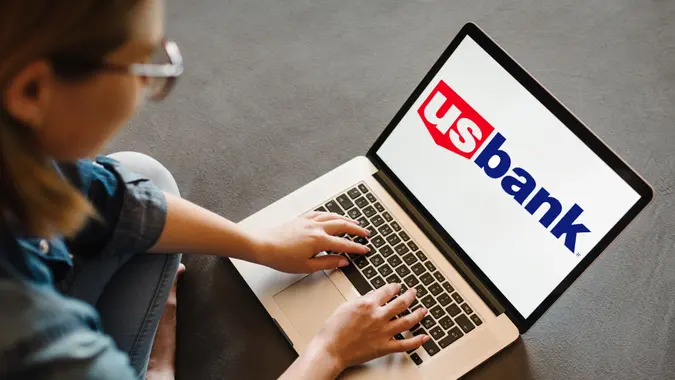
Commitment to Our Readers
GOBankingRates' editorial team is committed to bringing you unbiased reviews and information. We use data-driven methodologies to evaluate financial products and services - our reviews and ratings are not influenced by advertisers. You can read more about our editorial guidelines and our products and services review methodology.

20 Years
Helping You Live Richer

Reviewed
by Experts

Trusted by
Millions of Readers
If you’re here, you’ve likely decided on or are strongly considering opening a U.S. Bank account. U.S. Bank is the fifth-largest bank in America, with more than 70,000 employees and nearly $500 billion in assets, meaning they have the size and structure to suit your needs wherever you may be.
A recent GOBankingRates survey found that more than 30% of Americans don’t have bank accounts. And many who do never consider moving their assets to another bank — even when they’re offered lucrative sign-up bonuses to do so. Whether you’re a first-time bank account owner or you have experience across multiple banks, opening a U.S. Bank account is simple.
This guide will cover every step to opening an account with U.S. Bank, as well as main account features, how to avoid fees and whether U.S. Bank is the right choice for you.
Steps To Open a U.S. Bank Account
If you’re wondering how to open a U.S. Bank account, you’ve come to the right place. This guide will give you detailed instructions on finding the right account for you, what documents you’ll need to open it, how to apply in person or online and more.
1. Determine Which Bank Account You Want To Open
The U.S. Bank account you want to open depends on your current banking needs. Are you looking for a bill-pay account to use for rent, utilities and other monthly expenses? Or do you need a secure place to grow that new car fund?
U.S. Bank has a bevy of checking, savings, CD, investing and retirement accounts, but for the sake of simplicity, we’ll talk mostly about its checking and savings options.
If you need an account to pay bills and transfer money from, here are U.S. Bank’s checking account options:
- Easy Checking: Best for people who don’t need much from their bank; fewer fees and hassle
- Gold Checking: Best for people also looking to use a U.S. Bank credit card or loan
- Platinum Checking: Best for people with more money to deposit who want to earn interest
- Student Checking: Best for students
- Safe Debit Account: Best for people new to banking; no checks or overdraft fees
If you need an account to store a rainy day fund, money for college or just about any other long-term savings, here are U.S. Bank’s savings accounts:
- Standard Savings Account: Best for first-time savers with lower balances
- Platinum Select Money Market Savings: Best for people who also have a Platinum Checking Account
- Package Money Market Savings: Best for people who also have a Gold Checking Account
- Elite Money Market Account: Best for people with a higher balance who want to earn more interest
- Retirement Money Market: Best for retirement planners who want a tax-advantaged account
2. Gather Your Personal Information
You may be asking yourself “What do I need to open a U.S. Bank account?” Well, here are the U.S. Bank account opening requirements. Whether you’re applying for an account online or in person, you’ll still need these documents and information.
- Social Security number
- Driver’s license, state-issued ID or military ID (must be at least 18)
- Contact information (phone number, email, address)
- Opening deposit
The amount of the opening deposit will depend on the account, which an online application can tell you. If you’re opening the account in person, you can call the bank to see how much cash to bring ahead of time, or simply pay via a debit, credit or prepaid card from another institution.
3. Apply Online or in Person
You can apply to open an account either online or in person. The process should be simple if you have all the required documents listed above.
To apply online, follow these steps:
- Go to the U.S. Bank account page.
- Choose the type of account you’d like to open (checking, savings or CD)
- Click the button that says “Apply now” on the account you want to open
- Fill out the necessary information
You can also visit your nearest U.S. Bank branch and have a representative walk you through the application process. This is preferable for customers who are new to U.S. Bank or new to banking in general.
What To Do If You Need Help From U.S. Bank Customer Service
If you have questions that could best be answered by a U.S. Bank customer service representative, call one of the following numbers:
- New accounts: 800-653-2175
- General questions: 800-872-2657
You can also visit a U.S. Bank branch on a weekday or Saturday. Branch hours vary by location but are typically open between the hours of 10 a.m. and 4 p.m. local time.
U.S. Bank Account Fees and Features
You may be wondering “What are U.S. Bank’s account types?” Like any other major bank, U.S. Bank gives you access to a range of checking, savings, CD, brokerage and retirement accounts. This section will go over the main fees and features of U.S. Bank checking and savings accounts.
Checking Account Fees and Features
U.S. Bank has fees for all accounts, save for the Student Checking account, however, it is fairly easy to get these fees waived if you maintain the minimum balance or schedule recurring direct deposits.
The benefit of banking with a larger institution is the variety of products and services offered. U.S. Bank has checking accounts suited to first-time bank users, students, low-maintenance customers, customers with higher balances and customers seeking an interest-bearing account. It’s just about knowing what you’re looking for.
U.S. Bank Checking Accounts at a Glance
| Fees and Features | Easy Checking | Gold Checking | Platinum Checking | Student Checking | Safe Debit Account |
|---|---|---|---|---|---|
| Minimum opening deposit | $25 | $25 | $25 | $25 | $25 |
| Monthly service charge | $6.95 (may qualify to waive fee) | $14.95 (may qualify to waive fee) | $24.95 (may qualify to waive fee) | $0 | $4.95 (can’t be waived) |
| Out-of-network ATM withdrawal fee | $2.50 | $0 for first two withdrawals every month, then $2.50 | $0 | $0 for first four withdrawals every month, then $2.50 | $2.50 |
| Overdraft fee | $36 for an overdraft of more than $5 | $36 for an overdraft of more than $5 | $36 for an overdraft of more than $5 | $36 for an overdraft of more than $5 | $0 |
| Benefits | Low minimum deposit and threshold to waive fees | 100 free trades a year with a self-directed brokerage account | Interest-bearing account with 100 free trades a year through a brokerage account | Easy banking with no monthly fee | No overdraft fee |
Savings Account Fees and Features
Most of U.S. Bank’s savings accounts don’t have monthly maintenance fees, although they do require minimum deposits of $25 to $100. It should be noted that, like the vast majority of savings accounts, there is a fee of $15 for withdrawals beyond the allotted amount of six per month.
U.S. Bank has savings accounts suited to many different types of banking customers. If you’re a first-time bank user, don’t have much cash to store, are searching for savings and checking packages or seeking a higher interest-bearing account, you can find what you need at U.S. Bank.
U.S. Bank Savings Accounts at a Glance
| Fees and Features | Standard Savings Account | Platinum Select Money Market Savings | Package Money Market Savings | Elite Money Market Account | Retirement Money Market |
|---|---|---|---|---|---|
| Minimum opening deposit | $25 | $25 | $25 | $100 | $100 (or $25 monthly deposit) |
| Monthly service charge | $4 (may qualify to waive fee) | $0 | $0 | $10 (may qualify to waive fee) | $0 |
| Out-of-network ATM withdrawal fee | $2.50 | $2.50 | $2.50 | $2.50 | N/A |
| Overdraft fee | $36 for an overdraft of more than $5 | $36 for an overdraft of more than $5 | $36 for an overdraft of more than $5 | $36 for an overdraft of more than $5 | N/A |
| Benefits | Low deposit and balance minimums | Tiered interest rates based on balance. | Tiered interest rates based on balance. | Tiered interest rates based on balance | Tiered interest rates based on balance. |
How To Avoid Unwanted Fees
Avoiding banking fees from U.S. Bank is fairly simple. Here’s how you can do it:
- Know how much money is in your account so you don’t accidentally overdraw it and incur the $36 fee.
- Get cash from in-network ATMs, which can be found across the country.
- Maintain a minimum balance to avoid monthly fees, or have recurring direct deposits equaling a certain amount regularly.
- The requirements to avoid monthly fees are different for each account, so know what they are before you open the account.
- Don’t withdraw from your savings account more than six times per statement cycle.
Monitoring and Protecting Your Bank Account
The main reason that so many Americans won’t use online banking is the fear of fraud. But there are things you can do to help prevent this from happening. And, if you do become a victim of fraud, be assured that U.S. Bank accounts are FDIC insured up to $250,000, so as long as you’re below that amount, you’ll get your money back.
Here are some steps you can take to avoid fraud:
- Use strong passwords.
- Enable two-factor authentication, meaning your account is accessed with a two-step process including a password and fingerprint or face scan.
- Install cybersecurity protection on your computer and phone.
- Monitor your transaction history for suspicious activity.
- Turn on online banking alerts so you’ll be notified of each transaction.
Should You Open a U.S. Bank Account?
U.S. Bank has a wide variety of banking products and services, so finding an account that meets your needs shouldn’t be difficult. If you prioritize easy ATM and branch access, as well as a simple online and mobile banking interface, then U.S. Bank could be the right choice for you.
However, keep in mind that U.S. Bank’s highest interest rate offered on a savings account is only 0.05%, and that’s on balances of six figures or more. This is below the national average and well below what most online banks can offer you, as they have no overhead costs.
Your decision to open a U.S. Bank account is just that: yours. So if you’re into simple, easy-access banking, then U.S. Bank is a great fit for you. But if you don’t mind sacrificing physical banking for a better interest rate, then you may want to look at an online bank.
More on U.S. Bank
- U.S. Bank Review
- U.S. Bank Promotions
- U.S. Bank Interest Rates
- U.S. Bank Fees
- U.S. Bank ATM Withdrawal and Deposit Limits
This content is not provided by U.S. Bank. Any opinions, analyses, reviews or recommendations expressed in this article are those of the author alone and have not been reviewed, approved or otherwise endorsed by U.S. Bank.
 Written by
Written by  Edited by
Edited by 



